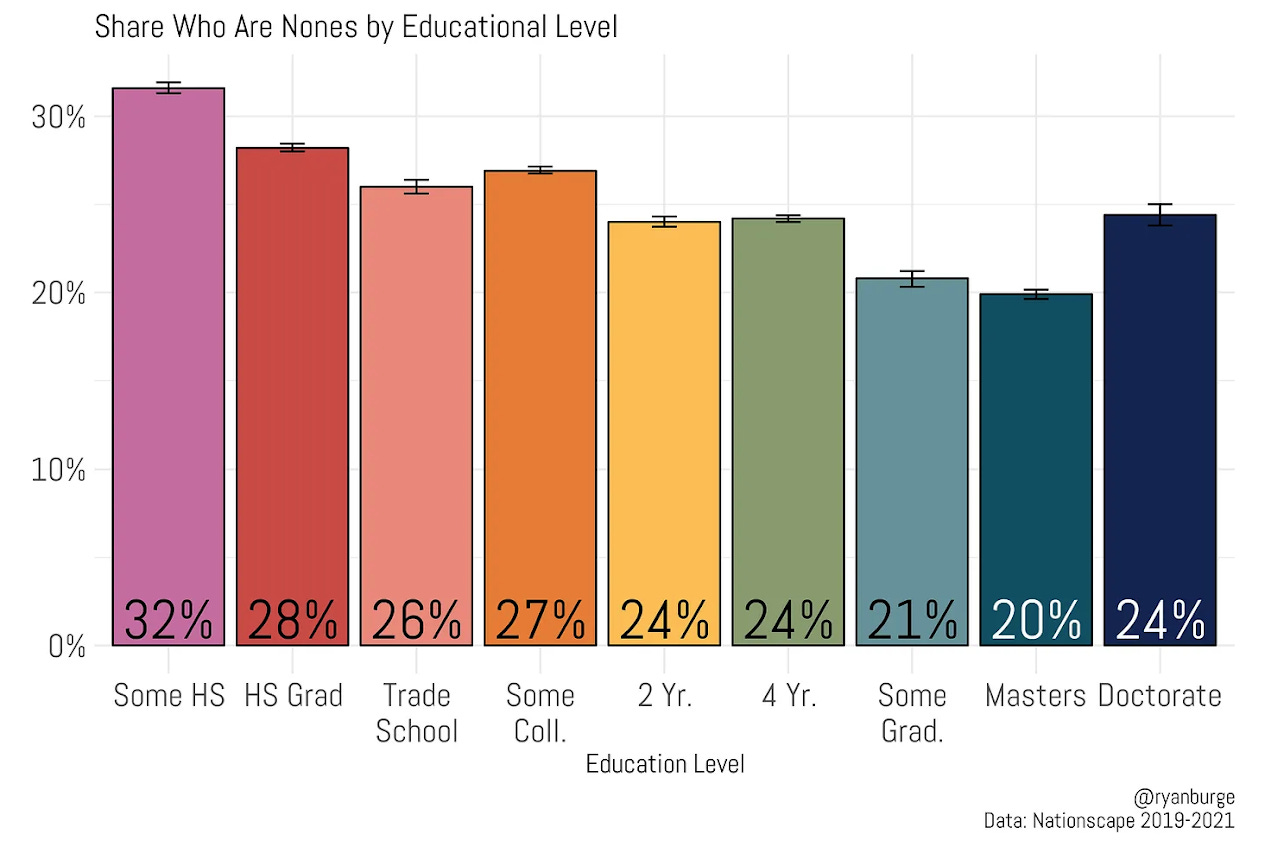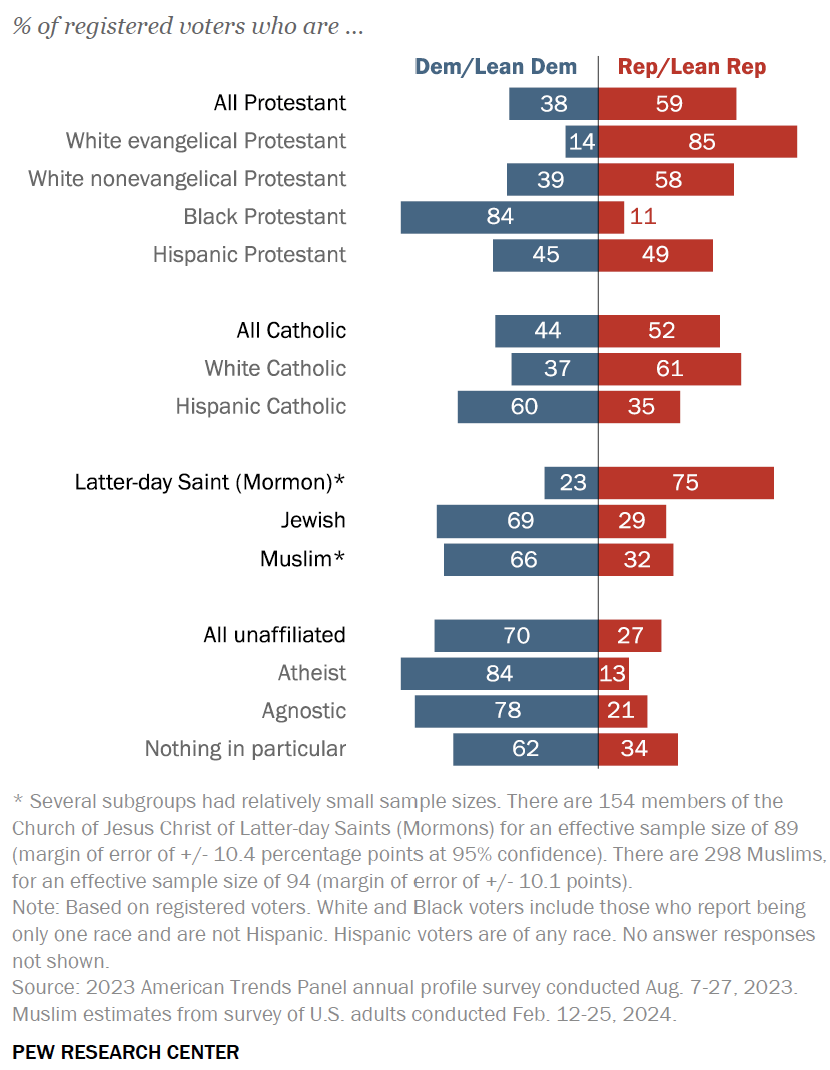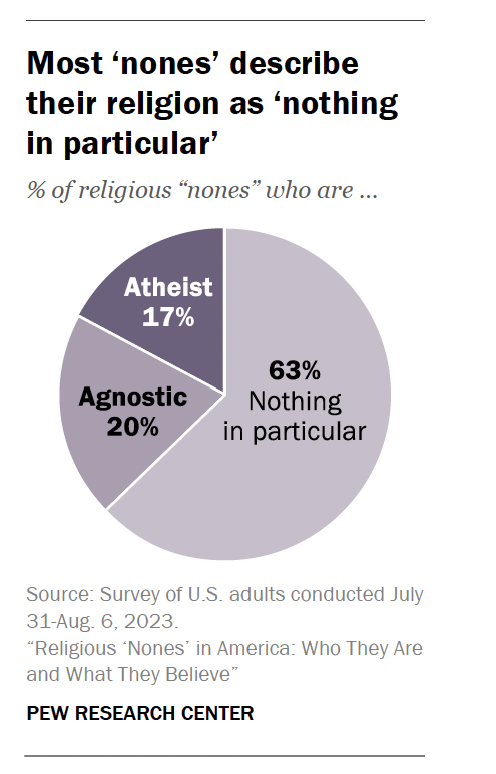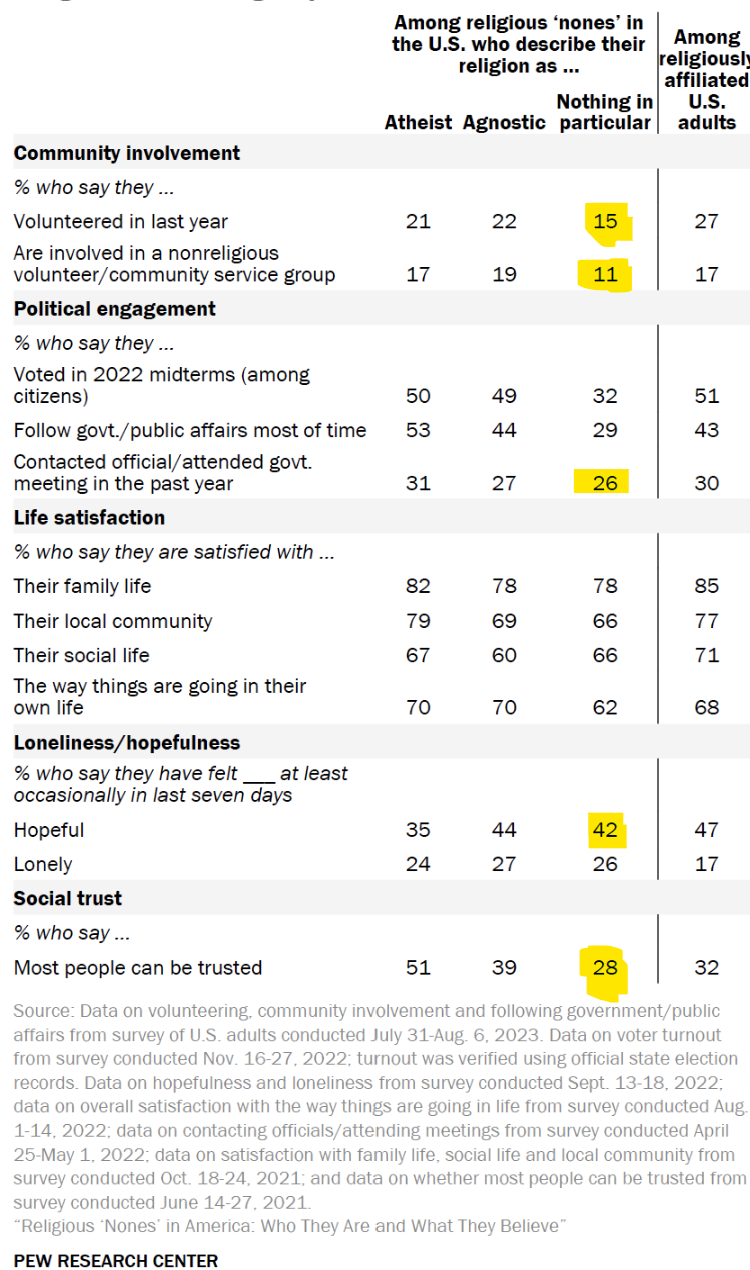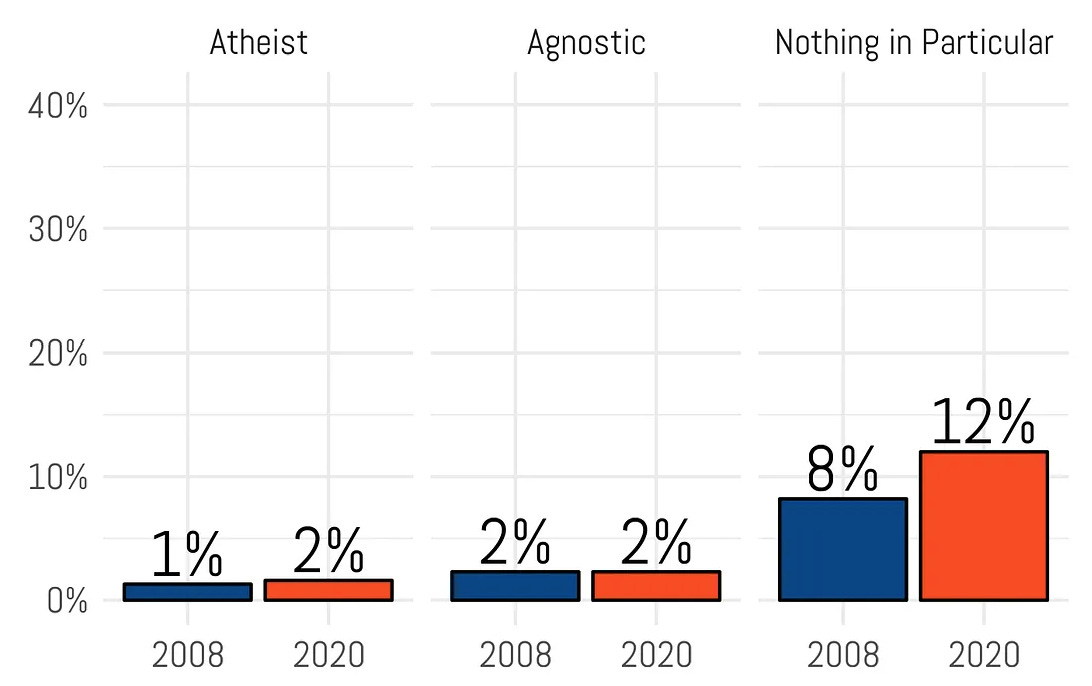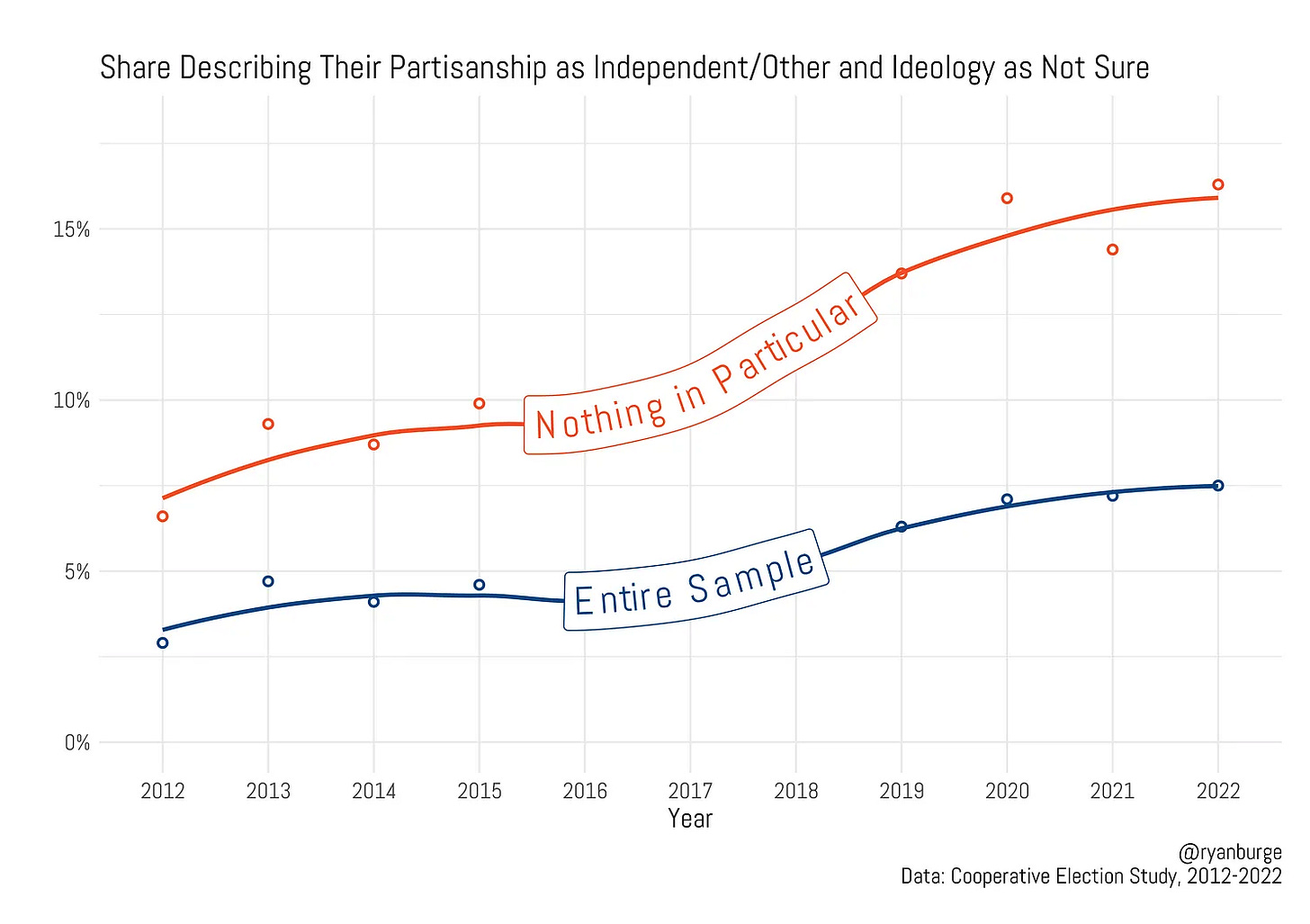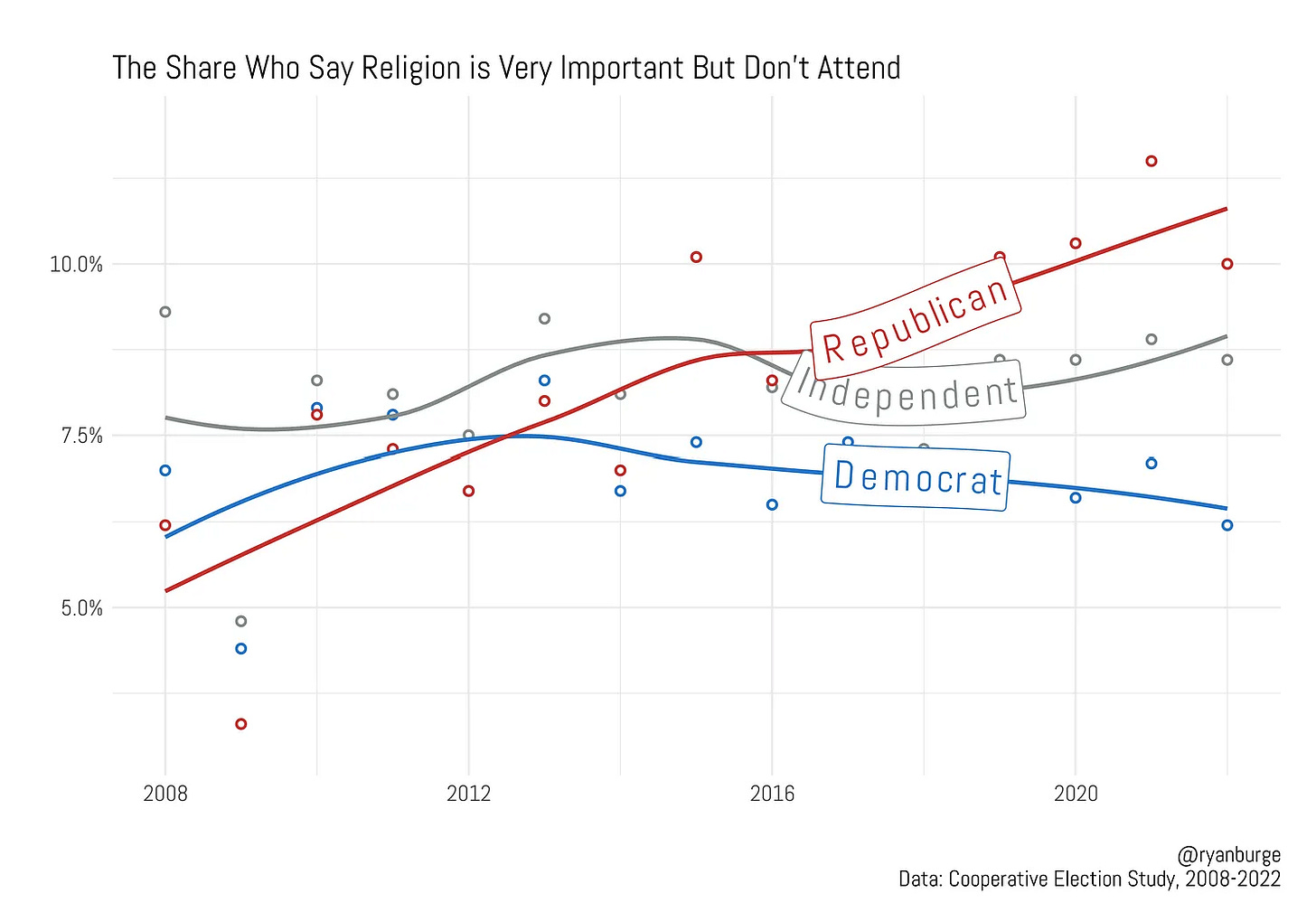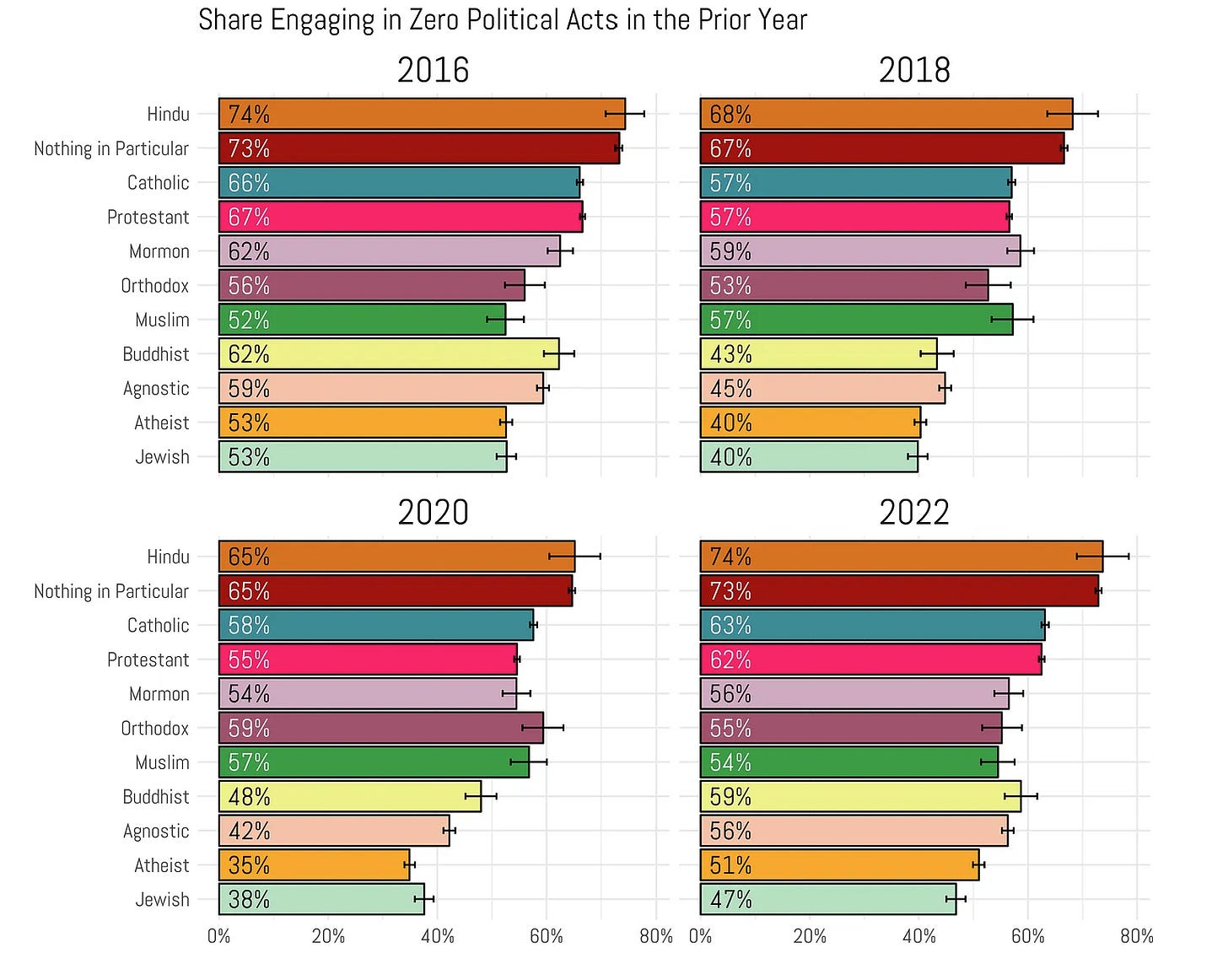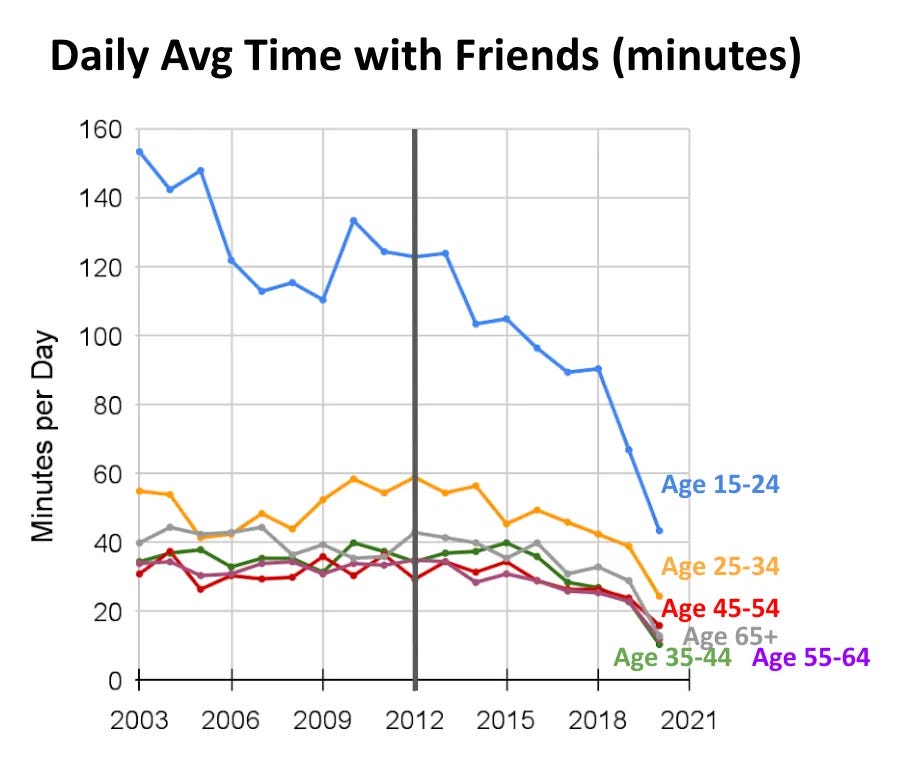Last time I wrote about this, I closed by clearly showing that in the political realignment, the GOP had won voters without a college degree, while voters with a college degree had moved substantially left. I also wrote about how the intuitively left voters who had moved into the Republican Party were economic leftists and immigration restrictionists due to zero-sum thinking.
Since then, the internet (James Lindsay, specifically) has come up with a term for this faction that seems to have stuck: Woke Right.
Woke Right is a fitting label because while they claim to reject identity politics, their zero-sum thinking means what they actually reject is the progressive claim that white men are at the top of the intersectional hierarchy. The woke right, like the woke left, believes in intersectional Marxism, it just believes white men are at the bottom and LGBTQ+ minority women are at the top, succeeding at their expense and calling the shots against them. They believe government should be large and leveraged against their enemies (people who deny them power and loyalty) and while they don’t attend church and have no idea what Christian theology is, they reminisce for a past that never existed, where they had the power they dream of, and they imagine that leveraging the power of God will get them there, turning traditional Christianity upside down.
This faction is mostly religious nones, specifically, “Nothing in particular” Americans. Again according to Ryan Burge1, this time analyzing both historical Cooperative Election Study data and Nationscape survey data through 2021, 32% of Americans without a high school diploma, 28% of Americans with only a high school diploma, and 26% of Americans who have attended trade school are religious “nones.”
As we’ve just established, the above segment of America is now majority Republican. Pew Research tells us a little more about religious nones, which allows us to further isolate the Republican-voting faction within this segment of Americans. Namely, Pew finds that as of 2023, the vast majority of atheists and agnostics favor Democrats.
Among “nothing in particular” Americans though, 34% favor Republicans2. Pew reports that in the same time frame, this segment of Americans is 63% of people identifying as “nones.”
This same group, “Nothing in particular” has incredibly low social trust. In fact, they have the lowest social trust of any political faction in America. They’re non-joiners: They don’t volunteer, they don’t attend social clubs, they’re extremely uninformed about government, and fewer than half of them have felt hopeful in a given week.
According to Ryan Burge, these self-identified “nothing in particular” Americans made up 12% of Republican voters in 20203 and 16% of Republican voters were “nothing in particular” on religion and ideology in 20224.
We could wrap it up here, except that in 2020, Loren Culp, what I would call the “woke right” candidate for Governor in WA, won nearly 18% of the primary vote in 20205.
Republicans, Burge notes, hate identifying as non-religious. In line with that, there’s a significant faction of Republicans who tell surveyors that they “seldom” or “never” attend church and yet they still highly value religion. We know from earlier data that Americans who seldom or never attend church are disproportionately likely to have low socioeconomic status, which correlates with zero-sum thinking and religious disaffiliation. We’ve seen that religious disaffiliation is correlated with extraordinarily low social trust and lack of hope. We’ve seen that some of these Americans are now supporting Republicans. Now let’s look at this small number of Americans who say they place a high value on religion but seldom or never attend religious services.
About 9% of Americans in 2022 said that religion is “very important” to them and they seldom or never attend religious services. Like the Americans whose ideology and faith are both “nothing in particular” this group of Americans is also becoming more Republican. In fact, they were 11% of Republicans nationally in 20226! Now we’re talking about a significant faction.
Now we’re going to look at one more Ryan Burge chart before we move on to other source material: The political activity of this faction. As mentioned by Pew, this group of Americans isn’t usually politically active, even as they’re increasingly more likely to vote for Republicans.
This set of Americans, the ideological and religious “nothing in particular” non-joiners who are increasingly left-leaning Republican voters? They became most active in 2020, when 35% of them engaged in a political act! Remember what I observed in Part 1?
“If they’d had in-person social connections, they lost them during the COVID-19 pandemic. I hypothesize that this faction is now finding social connection only in politics and during that social connection, practicing what Jonathan Haidt and Greg Lukianoff call ‘reverse CBT.’”
I believe this segment of low-propensity, non-ideological and non-religious, or non-ideological and unchurched “evangelical” Republican voters exists in the highest numbers in Blue states where there were already large numbers of unchurched, low-propensity, working-class swing voters beginning to reject progressive Democrats. Even though they are zero-sum thinkers, they reject identity politics and “pro-democracy” Democrats7 because they feel as though they should be recognized as the oppressed instead of the oppressors. They’re catastrophizing about the future, after all.
That’s not to say they’ve begun liking Republicans— they just hate Democrats slightly more. This is best demonstrated in a Suffolk University poll from 2021, wherein 55% of Republicans said they were more loyal to Trump than to the Republican Party8.
Now we’re going to deep-dive again. On the left, Jonathan Haidt, Greg Lukianoff, and Jean Twenge have convincingly shown that young people, namely Millennials through Gen Alpha, are the generations most involved in reverse CBT mediated by social media9. However, if we look at the cross-tabs from Suffolk University, we’ll see that in the Republican Party, the age group most loyal to Trump rather than the Party is 35 to 64-year-olds. Surprisingly to some, Republicans over 65 (according to the NBER working paper, the least likely to engage in zero-sum thinking and have left-leaning economic policy views) are the generation most loyal to the Party. The Republicans most loyal to Trump are Gen X and Boomers.
In this, we see that zero-sum thinking and left-leaning economic and immigration views within the Republican Party are not limited to social media native generations. I argue that:
This segment of Republican 50-64 yr-olds is the same segment that is “dropping out of everything” according to Ryan Burge10,
It is comprised of religious and ideological “nothing in particulars” and Americans who say they “seldom or never” attend religious services and yet religion is “very important” to them.
This segment of Republicans is mostly catastrophizing through social interactions on YouTube (or Rumble) and Facebook.
While some young people fit this (about 15%)10, most of them are…. 50 to 64 years old10. Burge says about this group:
“There were two factors that make someone more likely to say that religion is very important but they don’t go to church: age and political conservatism. … It’s just another example of people who like the idea of religion, but not the actual religious part.”
I got goosebumps when I read that last sentence as I’ve said nearly the exact same thing from my personal experiences with this faction. Now let’s look at another point I made: Lack of social connection.
Pew Research from 2023 shows that 83% of 50-64-year-olds use YouTube and 69% use Facebook. These two services are head and shoulders ahead of all other social media platforms for this generation11. Americans 55+ are also, according to Civic Science, the age group “most likely age group to rarely have in-person time with friends, if at all.” Further, their research shows that “Among people who rarely or never socialize with their friends in person, 80% reported feeling a sense of belonging ‘not at all often.’”12
Virtually all Americans saw an enormous reduction in their time spent socializing with friends and family in the wake of COVID-19. Zach Rausch documented for Jonathan Haidt how teenagers had already stopped spending time with friends before the pandemic, such that its impact on their socialization was minimal13. Every adult generation on the other hand, lost significant social time with friends as a result of the pandemic.
Between the increased crime14, the pandemic, inflation15, and time spent on YouTube and Facebook replacing in-person friendships, I believe a part of this segment of Americans became politically activated in a way that they previously had rarely or never been. They subsequently identified as Republicans for the first time out of reactionary anger for and extreme social distrust toward progressive control, from pandemic-era lockdowns to characterizations of violent riots as peaceful protests, to their perception that identity politics, mostly promoted by well-heeled Democrats, oppressed them.
Their newfound and continued affiliation with the Republican Party is very bad news for Republicans: The activism of this faction is alienating to all other factions of Republicans, who have community, purpose, and identity outside politics. Other Republicans of all stripes, but especially Committed Conservatives and Ambivalent Right, along with the few Stressed Sideliners voting Republican in Blue states, leave party activism, further enabling the takeover of the Party by this small faction. They don't have to increase their numbers, just outlast and alienate enough normal Republicans to change the culture of the Party. Lacking social trust and open anger being an in-group signal is also dangerous in another way: Traditional conservatives have less faith in government programs and bureaucracy than Democrats, but not necessarily less faith in the individuals that comprise the government. This is reversed among this faction. They believe big government programs are necessary to redistribute wealth to enable their success and replace them where they belong in democracy– respected equally based on merit. Moreover, this faction— woke right— is predisposed to summarily reject anyone who expresses greater social trust or less open anger than they do. This is different from every previous generation of populist activism on the right, including the TEA Party, which wanted to learn from experts about how to be more ideologically consistent and more market-based. This faction rejects all manner of experts and authority as people who are too trusting and have succeeded at their expense, which I hypothesize is a result of zero-sum thinking. They believe the people within the government are “establishment” or “uniparty” and to be severely distrusted because they have demonstrated disloyalty through insufficient anger and societal distrust.
Having explored who this faction is and why they are unlike other modern grafts onto the Republican Party, I will now explain why this Republican faction is also terrible for Republicans’ electoral outcomes.
In June of 2023, a NewsNation poll found that Americans overwhelmingly believe Republicans and Democrats should “be willing to compromise and work in a bipartisan way to pass legislation.”16 In 2019, so did a sizeable majority of Republicans: 61%!17 Even though each set of partisans believed it should be the other party that compromised, they believed in the practice of compromise. By the end of 2023, the Republican Party had undergone a radical realignment: A bare half of Republicans believed in “finding common ground with Democrats” and 49% said it was “more important for a Republican candidate to focus on pushing hard for policies Republicans want, even if it makes it much harder to get some things done.”18 That 49% of Republicans disproportionately supported Donald Trump in the 2024 Republican Primary, according to the same survey.
Until Republican voters share either ideology or an attitudinal approach to governing with other Americans, the Party will continue to lose elections. If this faction gains control of party apparatuses and continues participating in primaries, it will send Republicans into a doom loop that is difficult to escape. Republicans in remotely competitive districts and states will have to avoid the Party’s endorsement for the Party’s own sake. This toxic faction wrongly believes their attitudinal approach is embraced by the majority of “we the people” and anyone who tells them otherwise based on experience is categorically distrusted and believed disloyal because of it.
I see three potential correction points:
Being low-propensity voters, this faction has high churn rates for political action. Unless they defy trends, there may not be enough of them to have newcomers that replace and increase the current percentage.
Democrats suddenly wake up and recognize that these are actually completely winnable left-leaning low-propensity swing voters. All they have to do is stop actively promoting and demanding intersectional hierarchies and hiring and stop treating self-described MAGA voters with deep contempt.
Republicans figure out a way to scale individual relationship building (a la Braver Angels) so that most of the faction is willing to learn about conservative ideology, or Republicans identify a method of leveraging the reverence this group still has for at least one American trope (underdog success) at scale to draw this group into community and conservative ideology.
In conclusion, since 2020, I’ve observed the demographics of Party insiders change dramatically. Traditionally, Republicans have been the party of high-propensity, married, college-educated voters who believe in free minds and free markets. No more. Without either conversion of the “woke right” into ideological conservatism or suppression of their faction William F. Buckley style, I predict that Republicans pandering to them will wander in the wilderness for years to come in all but the most deeply Red states.
Burge, Ryan. “Religion Has Become a Luxury Good - by Ryan Burge.” Graphs about Religion, 26 June 2023, https://www.graphsaboutreligion.com/p/religion-has-become-a-luxury-good. Accessed 6 May 2024.
“Party affiliation of US voters by religious group.” Pew Research Center, 9 April 2024, https://www.pewresearch.org/politics/2024/04/09/party-identification-among-religious-groups-and-religiously-unaffiliated-voters/. Accessed 6 May 2024.
“The Religious Composition of the Political Parties Over the Last 50 Years.” Graphs about Religion, 6 November 2023, https://www.graphsaboutreligion.com/p/the-religious-composition-of-the. Accessed 7 May 2024.
Burge, Ryan. “Dropping Out Of Everything - by Ryan Burge.” Graphs about Religion, 22 April 2024, https://www.graphsaboutreligion.com/p/dropping-out-of-everything. Accessed 6 May 2024
Washington Secretary of State. “August 4, 2020 Primary Results.” 4 August 2020, https://results.vote.wa.gov/results/20200804/governor.html. Accessed 23 3 2025.
Burge, Ryan. “"Religion's Important, But I Don't Attend" - by Ryan Burge.” Graphs about Religion, 29 April 2024, https://www.graphsaboutreligion.com/p/religions-important-but-i-dont-attend. Accessed 7 May 2024.
“Commonsense Solidarity.” Jacobin, 8 November 2021, https://images.jacobinmag.com/wp-content/uploads/2021/11/08095656/CWCPReport_CommonsenseSolidarity.pdf. Accessed 7 May 2024.
Suffolk University. Suffolk University Poll Cross-Tabs, Suffolk University, 02 02 2021, https://www.suffolk.edu/-/media/suffolk/documents/academics/research-at-suffolk/suprc/polls/issues-polls/2021/2_22_2021_crosstabs_pdftxt.pdf. Accessed 7 May 2024.
Haidt, Jon. “Why the Mental Health of Liberal Girls Sank First and Fastest.” After Babel, 9 March 2023, https://www.afterbabel.com/p/mental-health-liberal-girls. Accessed 23 3 2025.
Burge, Ryan. “Dropping Out Of Everything - by Ryan Burge.” Graphs about Religion, 22 April 2024, https://www.graphsaboutreligion.com/p/dropping-out-of-everything. Accessed 6 May 2024
“Demographics of Social Media Users and Adoption in the United States.” Pew Research Center, 31 January 2024, https://www.pewresearch.org/internet/fact-sheet/social-media/. Accessed 7 May 2024.
“Less Than Half of Americans Regularly Socialize With Their Friends in Person.” CivicScience, 23 January 2023, https://civicscience.com/over-half-of-americans-regularly-socialize-with-friends-in-person-amid-growing-sense-of-belonging/. Accessed 7 May 2024.
Rausch, Zach, and Jon Haidt. “The new CDC report shows Covid added little to mental health trends.” After Babel, 16 February 2023, https://www.afterbabel.com/p/the-new-cdc-report. Accessed 7 May 2024.
Gramlich, John. “What we know about the increase in U.S. murders in 2020.” Pew Research Center, 27 October 2021, https://www.pewresearch.org/short-reads/2021/10/27/what-we-know-about-the-increase-in-u-s-murders-in-2020/. Accessed 7 May 2024.
“See how US inflation rates have changed since 2020.” The World Economic Forum, 31 May 2023, https://www.weforum.org/agenda/2023/05/us-monthly-inflation-rate-chart/. Accessed 7 May 2024.
Dorn, Andrew. “Full report.” NewsNation, 6 June 2023, https://www.newsnationnow.com/polls/newsnation-poll-economy-schools/. Accessed 7 May 2024.
Tyson, Alec. “Partisans value respect, compromise in politics – especially from other party.” Pew Research Center, 19 June 2019, https://www.pewresearch.org/short-reads/2019/06/19/partisans-say-respect-and-compromise-are-important-in-politics-particularly-from-their-opponents/. Accessed 7 May 2024.
“Trump Supporters Stand Out for Disliking Compromise as GOP Primaries Near.” Pew Research Center, 14 December 2023, https://www.pewresearch.org/politics/2023/12/14/in-gop-contest-trump-supporters-stand-out-for-dislike-of-compromise/. Accessed 7 May 2024.


